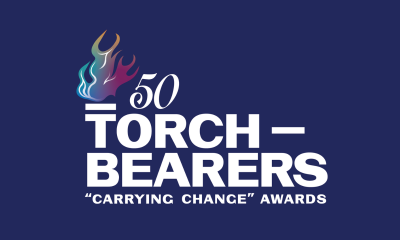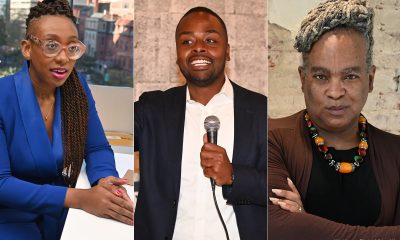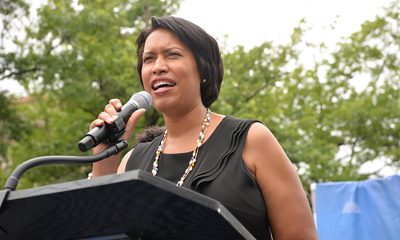Arts & Entertainment
SPOTLIGHTING LGBT HOMELESSNESS: Alston House celebrates a decade in operation
LGBT youth shelter named after slain D.C. activist
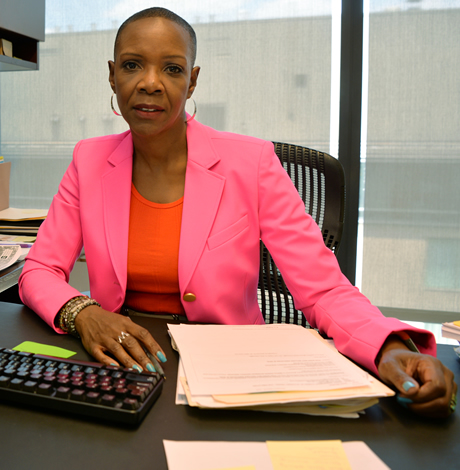
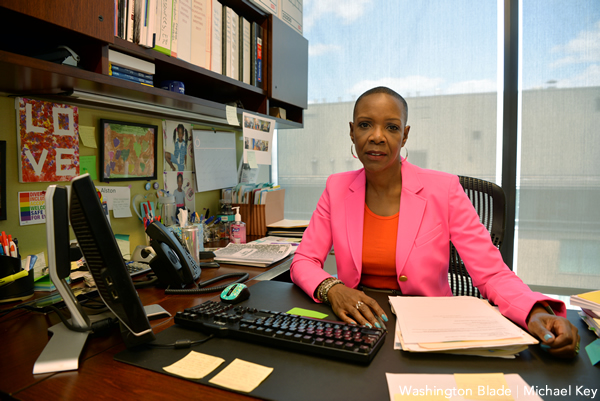
‘We are dealing with homeless youth that are isolated and rejected by the community,’ said June Crenshaw, executive director of the Wanda Alston Foundation.
This story is part of our contribution to the 2018 #DCHomelessCrisis news blitz. Local media outlets will be reporting and discussing stories about ending homelessness in the nation’s capital all day. The collaborative body of work is cataloged at dchomelesscrisis.press.
The first LGBT youth-focused shelter in D.C. is continuing its legacy of serving one of the most vulnerable demographics.
The Wanda Alston House and Foundation, now in its 10th year of service, serves LGBT individuals ages 16-24. The residential home-turned-shelter currently houses eight people, and hundreds have been through its doors over the last decade. The house is named after the late Wanda Alston, a D.C.-based LGBT activist who was murdered near her home in 2005.
Individuals enter the program based on their level of vulnerability and what kind of care the city’s homeless management providers think will best fit that person’s circumstances. The facility provides 24-hour support for residents through counseling, mental and medical health services. Tuition assistance and professional development is provided and other life skill services such as learning how to balance a checkbook, shop for groceries and manage a credit score are also offered. Residents receive three meals a day, clothing and toiletries as well as other necessities like Metro cards.
Full-time staff is trained, culturally competent and trauma-informed to ensure that all residents are supported. The operations manager and case manager work full-time at the house to make sure that everything runs smoothly and a clinical supervisor is also full-time to provide assessments and connect residents with the support they need.
The staff works together as an agency and as individuals to connect with the youths and help them cope, give support and help them navigate their lives. Sometimes that can be difficult and residents can respond by acting out.
“We are dealing with homeless youth that are isolated and rejected by the community,” says June Crenshaw, executive director of the Wanda Alston Foundation. “They’re forced to survive some unspeakable situations. Most, if not all, arrive having experienced some severe trauma. This can show up in less-than-positive ways like addiction, inability to cope with stress or not being able to navigate positive communication skills. But they’re human and they’ve had to endure circumstances that most of us couldn’t survive.”
Crenshaw, a self-identified “old-fashioned” lesbian and woman of color, says most youth in the program are women of color.
“When I started in this role two years ago, a resident came to me and said she never saw a person that looked like me in a leadership role. That stuck with me,” she says. “I’m proud to be a brown woman of the community that’s working hard to make things better.”
The program at the Wanda Alston House is slightly different from the programs at other LGBT shelters, she says. There are certain requirements that the residents must participate in that help them accomplish their personal goals within the 18-24 months they live there.
“We provide connections and care in all the ways that a person would need,” Crenshaw says.
After leaving the house, individuals stay connected to the care at the facility for 90 days-six months. Staff continues to support them however they need it — like buying groceries, clothes or Metro cards and finding housing and employment as well as providing case management to help them navigate other support and services available.
Crenshaw says there’s an “epidemic of LGBT homelessness.” Around 50 percent of the homeless youth in D.C. are LGBT-identifying. At the Wanda Alston House, residents “talk and share experiences around being treated differently, misgendered, disrespected, attacked and discriminated against.”
She says the city is committed to the youth but that in homeless centers that are not culturally sensitive to LGBT people, “grave mistreatments” can occur.
“Our population is trending as the most affected by homelessness and mental health issues,” she says. “We have a responsibility to do better by our youth, make sure they stay safe and are allowed to thrive. Facilities like ours are needed as long as these circumstances exist.”
The facility costs slightly over half a million dollars to run each year and most comes from local government offices such as the Mayor’s Office of LGBT Affairs. Grant dollars are used to run the shelter and pay staff, but that doesn’t cover all the expenses. They also rely on fundraising and the LGBT community and allies to support them. Donations amount to 25 percent of the budget.
Although D.C. has some of the most progressive laws in the nation and has been widely noted as one of the U.S. cities LGBT individuals can feel most open and supported, the competitive job market and high cost of living creates difficulties for LGBT people. LGBT people of color are more likely to be unemployed and represent a large portion of impoverished individuals and victims, Crenshaw says.
D.C. has the highest number per capita of LGBT individuals compared to other American cities. Crenshaw says not enough of the resources the city provides for homeless people are going to LGBT organizations and there is a lot of work yet to be done to resolve this epidemic.
The Wanda Alston House, however, has survived the turbulence of 10 years of operation and Crenshaw says they are ready and looking forward to at least another 10.
Arts & Entertainment
Catherine O’Hara, ‘Schitt’s Creek’ star and celebrated queer ally, dies at 71
Actress remembered for memorable comedic roles in ‘Beetlejuice’ and ‘Home Alone’
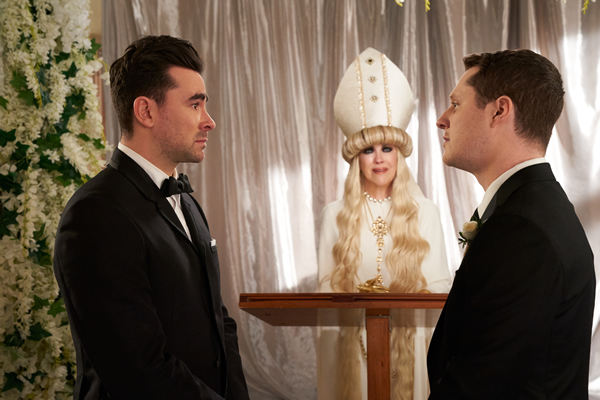
Catherine O’Hara, the varied comedic actor known for memorable roles in “Beetlejuice,” “Schitt’s Creek,” and “Home Alone,” has died at 71 on Friday, according to multiple reports. No further details about her death were revealed.
O’Hara’s death comes as a shock to Hollywood, as the Emmy award-winning actor has been recently active, with roles in both “The Studio” and “The Last of Us.” For her work in those two shows, she received Emmy nominations for outstanding supporting actress in a comedy series and outstanding guest actress in a drama series.
In 2020, O’Hara won the Outstanding Lead Actress in a comedy series award for her work in the celebrated sixth and final season of “Schitt’s Creek.” She was also known as a queer ally and icon for her theatrical and often campy performances over multiple decades. In “Schitt’s Creek,” she played Moira Rose, the wig-loving mother of David Rose (played by series creator Dan Levy). David is pansexual, but the characters around him simply accept him for who he is; the show was embraced by the LGBTQ community with how naturally David’s sexuality was written and portrayed. That show ran from 2015 to 2020 and helped bring O’Hara and her co-stars into a new phase of their careers.
In a 2019 interview with the Gay Times, O’Hara explained why the show got LGBTQ representation right: “Daniel has created a world that he wants to live in, that I want to live in. It’s ridiculous that we live in a world where we don’t know how to respect each other and let each other be. It’s crazy. Other shows should follow suit and present the world and present humans as the best that we can be. It doesn’t mean you can’t laugh, that you can’t be funny in light ways and dark ways. It’s all still possible when you respect and love each other.”
Additional credits include “SCTV Network” (for which O’Hara won a writing Emmy), “Beetlejuice Beetlejuice,” “Curb Your Enthusiasm,” “Six Feet Under,” “Best in Show,” “Home Alone 2: Lost in New York,” and “Dick Tracy.” O’Hara also lent her voice to “The Nightmare Before Christmas,” “Chicken Little,” “Monster House,” and “Elemental.” O’Hara was expected to return for Season 2 of “The Studio,” which started filming earlier this month.

Friday, January 30
Friday Tea Time will be at 12 p.m. at the DC Center for the LGBT Community. This is a social hour for older LGBTQ+ adults. Bring your beverage of choice. For more information, contact Mac ([email protected]).
Spark Social will host “RuPaul’s Drag Race S18 Watch Party” at 8 p.m. This event will be hosted by local drag queens TrevHER and Grey, who will provide hilarious commentary and make live predictions on who’s staying and who’s going home. Stick around after the show for a live drag performance. This event is free and more details are available on Eventbrite.
Saturday, January 31
Go Gay DC will host “LGBTQ+ Community Brunch” at 11 a.m. at Freddie’s Beach Bar & Restaurant. This fun weekly event brings the DMV area LGBTQ+ community, including allies, together for delicious food and conversation. Attendance is free and more details are available on Eventbrite.
Sunday, February 1
Go Gay DC will host “LGBTQ+ Community and Conversation” at noon at As You Are. This event is for those looking to make more friends and meaningful connections in the LGBTQ+ community. Look for the Go Gay DC sign on the long table near the front window. Attendance is free and more details are available on Eventbrite.
Monday, February 2
“Center Aging: Monday Coffee Klatch” will be at 10 a.m. on Zoom. This is a social hour for older LGBTQ+ adults. Guests are encouraged to bring a beverage of choice. For more information, contact Adam (adamheller@thedccenter.org).
Tuesday, February 3
Universal Pride Meeting will be at 7 p.m. on Zoom. This group seeks to support, educate, empower, and create change for people with disabilities. For more information, email [email protected].
Wednesday, February 4
Job Club will be at 6 p.m. on Zoom upon request. This is a weekly job support program to help job entrants and seekers, including the long-term unemployed, improve self-confidence, motivation, resilience and productivity for effective job searches and networking — allowing participants to move away from being merely “applicants” toward being “candidates.” For more information, email [email protected] or visit thedccenter.org/careers.
Center Aging Women’s Social and Discussion Group will be at 7 p.m. on Zoom. This group is a place where older LGBTQ+ women can meet and socialize with one another. There will be discussion, activities, and a chance for guests to share what they want future events to include. For more details, visit the DC Center’s website.
Thursday, February 5
The DC Center’s Fresh Produce Program will be held all day at the DC Center for the LGBT Community. People will be informed on Wednesday at 5:00 pm if they are picked to receive a produce box. No proof of residency or income is required. For more information, email [email protected] or call 202-682-2245.
Virtual Yoga Class will be at 7 p.m. on Zoom. This free weekly class is a combination of yoga, breath work and meditation that allows LGBTQ+ community members to continue their healing journey with somatic and mindfulness practices. For more details, visit the DC Center’s website.
a&e features
D.C. LGBTQ sports bar Pitchers listed for sale
Move follows months of challenges for local businesses in wake of Trump actions
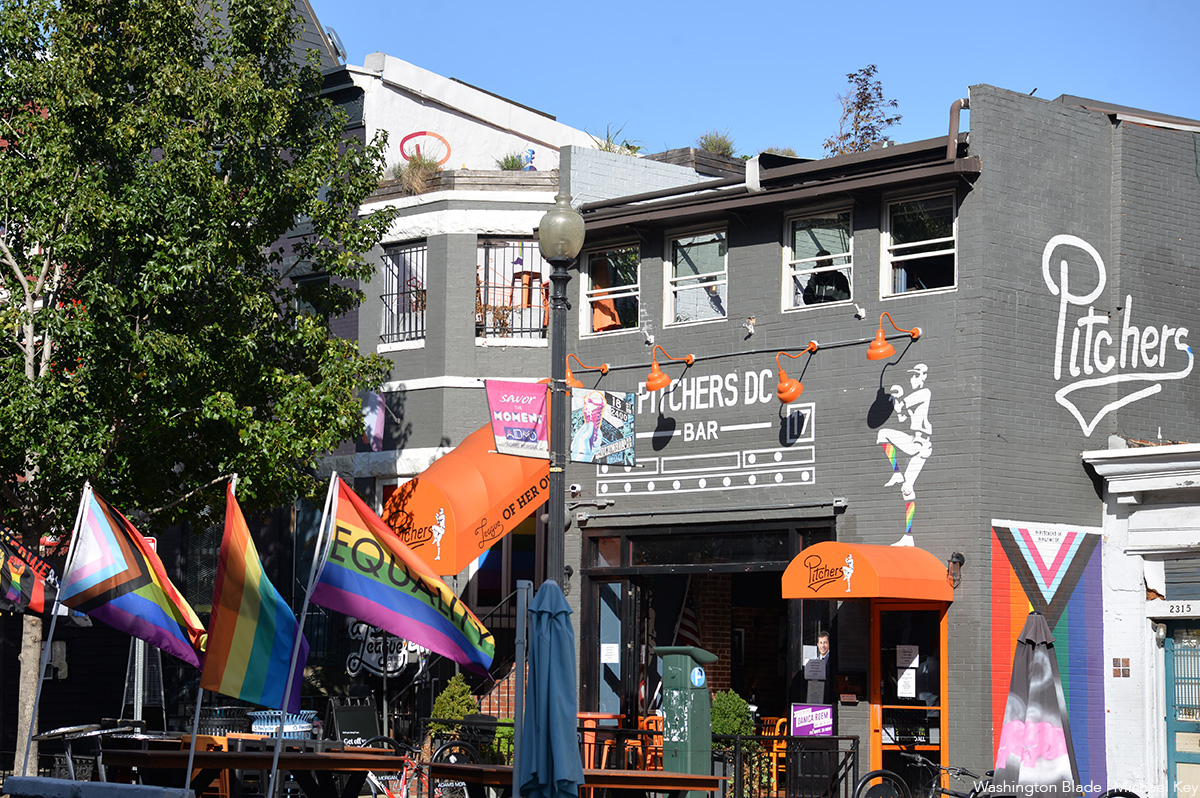
A Santa Monica, Calif.-based commercial real estate company called Zacuto Group has released a 20-page online brochure announcing the sale of the D.C. LGBTQ sports bar Pitchers and its adjoining lesbian bar A League of Her Own.
The brochure does not disclose the sale price, and Pitchers owner David Perruzza told the Washington Blade he prefers to hold off on talking about his plans to sell the business at this time.
He said the sale price will be disclosed to “those who are interested.”
“Matthew Luchs and Matt Ambrose of the Zacuto Group have been selected to exclusively market for sale Pitchers D.C., located at 2317 18th Street, NW in Washington, D.C located in the vibrant and nightlife Adams Morgan neighborhood,” the sales brochure states.
“Since opening its doors in 2018, Pitchers has quickly become the largest and most prominent LGBTQ+ bar in Washington, D.C., serving as a cornerstone of D.C.’s modern queer nightlife scene,” it says, adding, “The 10,000+ SF building designed as a large-scale inclusive LGBTQ+ sports bar and social hub, offering a welcoming environment for the entire community.”
It points out that the Pitchers building, which has two years remaining on its lease and has a five-year renewal option, is a multi-level venue that features five bar areas, “indoor and outdoor seating, and multiple patios, creating a dynamic and flexible layout that supports a wide range of events and high customer volume.”
“Pitchers D.C. is also home to A League of Her Own, the only dedicated lesbian bar in Washington, D.C., further strengthening its role as a vital and inclusive community space at a time when such venues are increasingly rare nationwide,” the brochure says.
Zacuto Group sales agent Luchs, who serves as the company’s senior vice president, did not immediately respond to a phone message left by the Blade seeking further information, including the sale price.
News of Perruzza’s decision to sell Pitchers and A League of Her Own follows his Facebook postings last fall saying Pitchers, like other bars in D.C., was adversely impacted by the Trump administration’s deployment of National Guard soldiers on D.C. streets
In an Oct. 10 Facebook post, Perruzza said he was facing, “probably the worst economy I have seen in a while and everyone in D.C. is dealing with the Trump drama.” He told the Blade in a Nov. 10 interview that Pitchers continued to draw a large customer base, but patrons were not spending as much on drinks.
The Zacuto Group sales brochure says Pitchers currently provides a “rare combination of scale, multiple bars, inclusivity, and established reputation that provides a unique investment opportunity for any buyer seeking a long-term asset with a loyal and consistent customer base,” suggesting that, similar to other D.C. LGBTQ bars, business has returned to normal with less impact from the Trump related issues.
The sales brochure can be accessed here.
-

 Opinions5 days ago
Opinions5 days agoICE agents murder another American citizen in Minneapolis
-

 Books5 days ago
Books5 days ago‘The Director’ highlights film director who collaborated with Hitler
-

 LGBTQ Non-Profit Organizations4 days ago
LGBTQ Non-Profit Organizations4 days agoTask Force urges renewed organizing amid growing political threats
-

 Russia4 days ago
Russia4 days agoRussia designates ILGA World an ‘undesirable’ group

